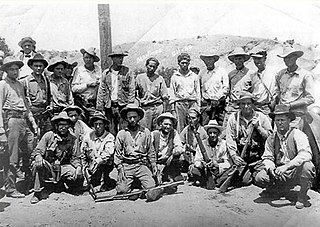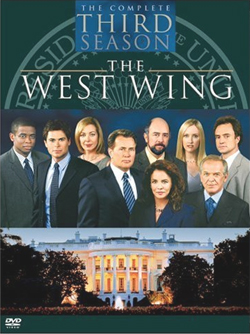
The Posse Comitatus Act is a United States federal law signed on June 18, 1878, by President Rutherford B. Hayes which limits the powers of the federal government in the use of federal military personnel to enforce domestic policies within the United States. Congress passed the Act as an amendment to an army appropriation bill following the end of Reconstruction and updated it in 1956, 1981 and 2021.
Posse is a shortened form of posse comitatus, a group of people summoned to assist law enforcement. The term is also used colloquially to mean a group of friends or associates.
Election day is the day on which political elections are held.
Comitatus is the Latin term for an armed escort or retinue.
Gordon Wendell Kahl was an American World War II veteran and farmer who was known for being a one-time member of the Posse Comitatus movement and for his involvement in two fatal shootouts with law enforcement officers in the United States in 1983.
The Posse Comitatus is a loosely organized American far-right extremist social movement which began in the late 1960s. Its members spread a conspiracy-minded, anti-government, and anti-Semitic message linked to white supremacy aiming to counter what they believe is an attack on their social and political rights as white Christians.

The sovereign citizen movement is a loose group of anti-government activists, litigants, tax protesters, financial scammers, and conspiracy theorists based mainly in the United States. Sovereign citizens have their own pseudolegal belief system based on misinterpretations of common law and claim to not be subject to any government statutes unless they consent to them. The movement appeared in the United States in the early 1970s and has since expanded to other countries; the similar freeman on the land movement emerged during the 2000s in Canada before spreading to other Commonwealth countries. The FBI describes sovereign citizens as "anti-government extremists who believe that even though they physically reside in this country, they are separate or 'sovereign' from the United States".

The Insurrection Act of 1807 is a United States federal law that empowers the president of the United States to deploy U.S. military and federalized National Guard troops within the United States in particular circumstances, such as to suppress civil disorder, insurrection, or rebellion.
Full disclosure or Full Disclosure may refer to:
Fitzpatrick may refer to:

The South Carolina National Guard (SCNG) consists of the South Carolina Army National Guard and the South Carolina Air National Guard.
August Byron Kreis III is an American neo-Nazi leader and convicted child molester. He was a member of the Ku Klux Klan (KKK), the Posse Comitatus, and Aryan Nations.

The Adjutant General of Oklahoma is the highest-ranking military official in the state of Oklahoma, subordinate only to the Governor of Oklahoma. The highest officer of the Oklahoma National Guard, the Adjutant General is the principal advisor to the Governor on military affairs and the head of the Oklahoma Military Department as the Secretary of the Military.

American militia movement is a term used by law enforcement and security analysts to refer to a number of private organizations that include paramilitary or similar elements. These groups may refer to themselves as militia, unorganized militia, and constitutional militia. While groups such as the Posse Comitatus existed as early as the 1980s, the movement gained momentum after standoffs with government agents in the early 1990s. By the mid-1990s, such groups were active in all 50 US states, with membership estimated at between 20,000 and 60,000. The movement is most closely associated with the American right-wing.

The posse comitatus, frequently shortened to posse, is in common law a group of people mobilized by the conservator of peace – typically a reeve, sheriff, chief, or another special/regional designee like an officer of the peace potentially accompanied by or with the direction of a justice or ajudged parajudicial process given the imminence of actual damage – to suppress lawlessness, defend the people, or otherwise protect the place, property, and public welfare. The posse comitatus as an English jurisprudentially defined doctrine dates back to ninth-century England and the campaigns of Alfred the Great simultaneous thereafter with the officiation of sheriff nomination to keep the regnant peace. There must be a lawful reason for a posse, which can never be used for lawlessness.

The Enforcement Act of 1870, also known as the Civil Rights Act of 1870 or First Ku Klux Klan Act, or Force Act, is a United States federal law that empowers the President to enforce the first section of the Fifteenth Amendment throughout the United States. The act was the first of three Enforcement Acts passed by the United States Congress in 1870 and 1871, during the Reconstruction Era, to combat attacks on the voting rights of African Americans from state officials or violent groups like the Ku Klux Klan.
Family Farm Preservation was a right-wing agrarian populist organisation in the United States which promoted a grass-roots movement in order to prevent family farms from being foreclosed upon. The group has been linked to the earlier right-wing organization Posse Comitatus, and in some reports is alleged to be a direct outgrowth.

The third season of the American political drama television series The West Wing aired in the United States on NBC from October 3, 2001 to May 22, 2002 and consisted of 21 episodes and 2 special episodes.

Crawley P. Dake was a lawman and business owner best known for having served as the U.S. Marshal for the Arizona Territory from 1878 to 1882, during a time of notorious lawlessness in frontier towns like Tombstone. A veteran of the American Civil War, Dake was noted for his creativity and for his frequent deputizing of civilian posses after the Posse Comitatus Act of 1878 was passed.
The separation of military and police roles is the principle by which the military and law enforcement perform clearly differentiated duties and do not interfere with each other's areas of discipline. Whereas the military's purpose is to fight wars, law enforcement is meant to enforce domestic law. Neither is trained specifically to do the other's job. Military and law enforcement differ, sometimes fundamentally, in areas such as source of authority, training in use of force, training in investigation and prosecution, and training in enforcing laws and ensuring civil liberties.







